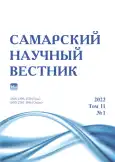The ways to develop students’ self-organization and self-education competences in the process of studying further mathematics
- Authors: Trindyk T.V.1, Kochetova N.G.2
-
Affiliations:
- Samara National Research University
- Samara State University of Social Sciences and Education
- Issue: Vol 11, No 1 (2022)
- Pages: 332-339
- Section: Pedagogical Sciences
- URL: https://bakhtiniada.ru/2309-4370/article/view/108366
- DOI: https://doi.org/10.55355/snv2022111312
- ID: 108366
Cite item
Full Text
Abstract
The paper describes the way of pedagogical conditions implementation that ensures the development of self-organization and self-education competences among technical university students. The theoretical substantiation of the need to create an integral complex of such conditions at a technical university is presented, the definition of organizational, pedagogical, psychological and didactic conditions for the development of self-organization and self-education competences among students is given, and the means of their implementation developed by the authors are listed. The possibilities of the traditional subject content are shown on the example of the course «Further Mathematics» for the purposeful development of cognitive, personal and activity components of self-organization and self-education competences. Examples from the developed set of tasks for the course «Further Mathematics» are given, as well as tasks of a project and research nature. All these tasks are aimed at the development of such regulatory actions that are part of self-organization and self-education competences, as forecasting, goal setting, planning, control, reflection, as well as such qualities of thinking as flexibility (variability), rationality, speed. Some results of experimental verification of the developed tasks effectiveness (for the activity and personal components of self-organization and self-education competences) are presented, proving the expediency of using them in the educational process at the university. The methods described in the paper for the pedagogical conditions implementation that ensure the development of self-organization and self-education competences among students of a technical university are invariant with respect to the subject content and can be extended to teaching other disciplines.
Full Text
##article.viewOnOriginalSite##About the authors
Tatiana Vladimirovna Trindyk
Samara National Research University
Email: tv.trindyk@mail.ru
senior lecturer of Further Mathematics Department
Russian Federation, SamaraNataliya Gennadievna Kochetova
Samara State University of Social Sciences and Education
Author for correspondence.
Email: fnodekan@mail.ru
candidate of physical and mathematical sciences, associate professor, dean of Primary Education Faculty
Russian Federation, SamaraReferences
- Федеральный государственный образовательный стандарт высшего образования [Электронный ресурс] // http://fgosvo.ru/uploadfiles/FGOS VO 3++.
- Дедю И.И. Самоорганизация // Экологический энциклопедический словарь. Кишинев: Главная редакция Молдавской советской энциклопедии, 1989. 406 с.
- Хакен Г. Тайны природы. Синергетика: учение о взаимодействии. М.-Ижевск: Институт компьютерных исследований, 2003. 320 с.
- Калин В.К. Актуальные аспекты теории воли // Эмоционально-волевая регуляция поведения и деятельности: мат-лы тез. второго всесоюз. семинара молодых ученых. Симферополь, 1986. С. 120-131.
- Дьяков С.И. Психическая самоорганизация человека как субъекта жизни. Семантический принцип // Известия Иркутского государственного университета. Серия «Психология». 2018. Т. 23. С. 15-27.
- Зубова С.П., Лысогорова Л.В., Триндюк Т.В. О понятии самоорганизации в синергетике и педагогике // Гуманитарные Балканские исследования - Болгария. 2020. Т. 4, № 3 (9). С. 39-41.
- Триндюк Т.В., Кочетова Н.Г., Лысогорова Л.В. О взаимосвязи понятий «самоорганизация» и «самообразование» // Балканское научное обозрение. 2020. Т. 4, № 4 (10). С. 20-22. doi: 10.34671/SCH.BSR.2020.0404.0005.
- Новикова Н.А. Социально-культурная самоорганизация учащейся молодежи в контексте личностно-ориентированного подхода // Фундаментальные исследования. 2013. № 10-13. С. 2978-2981.
- Сергеев А.Г. Компетентность и компетенции: монография. Владимир: Изд-во Владимирского гос. ун-та, 2010. 107 с.
- Азимов Э.Г., Щукин А.Н. Самообучение // Новый словарь методических терминов и понятий (теория и практика обучения языкам). М.: Икар, 2009. С. 268.
- Самоорганизация // Большой психологический словарь / под ред. Б.Г. Мещерякова, В.П. Зинченко. Изд. 4-е, расш. М.: АСТ; СПб.: Прайм-Еврознак, 2009. С. 437.
- Дмитриева Е.Н. Самообразование в системе профессиональной подготовки педагога: теоретические основы и практическая реализация: монография. Нижний Новгород: НГЛУ им. Н.А. Добролюбова, 2001. 133 с.
- Баньковская Н.И. Представления о мотивации к самообразованию учащихся в современной психологии // Известия Тульского государственного университета. Гуманитарные науки. 2011. № 2. С. 342-352.
- Мирошниченко Э.А. Организация самообразования обучающихся экономического вуза: автореф. дис. … канд. пед. наук: 13.00.08. Запорожье, 1998. 191 с.
- Казанская Л.А. Сущность и особенности самоуправления личности: автореф. дис. … канд. соц. наук: 22.00.08. Уфа, 2005. 28 с.
- Галямина А.В. Формирование компетенции самоорганизации учебной деятельности курсантов военных вузов (на материале дисциплины «иностранный язык»): автореф. дис. … канд. пед. наук: 13.00.08. Калининград, 2017. 198 с.
- Костромина С.Н. Психологические основания формирования профессионала на этапе обучения в вузе // Вестник Санкт-Петербургского университета. Сер. 12. 2008. Вып. 4. С. 329-340.
- Котова С.С. Формирование компетенций самоорганизации учебно-профессиональной деятельности обучающихся вузов: дис. … канд. пед. наук: 13.00.08. Екатеринбург, 2008. 225 с.
- Савва Л.И., Рабина Е.И. Педагогические условия, способствующие развитию умений самоорганизации времени обучающихся вуза // Вестник ЮУрГУ. Серия «Образование. Педагогические науки». 2011. № 3. С. 100-105.
- Ломин С.А., Осин А.К. Дидактические условия формирования самоорганизации учебной деятельности обучающихся // Успехи современного естествознания. 2013. № 10. С. 135-136.
- Наинг Х.Х. Формирование умений самоорганизации у обучающихся-химиков на основе синергетического подхода: дис. … канд. пед. наук: 13.00.08. Курск, 2015. 169 с.
Supplementary files












